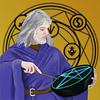Take a photo of a barcode or cover
Graphic: Adult/minor relationship, Animal cruelty, Animal death, Body horror, Child abuse, Child death, Death, Genocide, Physical abuse, Racism, Rape, Sexual assault, Violence, Blood, Excrement, Antisemitism, Fire/Fire injury
Graphic: Adult/minor relationship, Alcoholism, Animal cruelty, Animal death, Child abuse, Child death, Death, Emotional abuse, Gore, Incest, Mental illness, Pedophilia, Physical abuse, Racism, Rape, Sexual assault, Sexual content, Sexual violence, Violence, Antisemitism, Murder, Sexual harassment, War, Injury/Injury detail
It's difficult to rate this book. In turns it earns itself both 5 stars, and 1. It's also one of those books that it's hard to say you enjoyed, but don't regret having read.
The unnamed protagonist of the story is a small boy. His exact background is left vague - we only know that his parents sent him away to live in a remote area with another family. He's also dark haired and complected (for an Eastern European.) People throughout the novel take him for a Jew or a gypsy, but the boy himself never claims one or the other.
The boy remains a cipher through most of the book. He is repeatedly shown to be a vessel into which anyone in a position of authority over him can pour any belief they wish. This allows Kosinski to ruminate about a variety of subjects from the uncomplicated viewpoint of a child and true-believer, injecting sincerity or irony into the text as necessary. It's quite effective, and the author's use of imagery and metaphor is powerfully done.
Where the novel seems to lose its way is in its depictions of cruelty. These, too, are beautifully written in their starkness. But it wallows in it without point sometimes - seemingly recounting these episodes of cruelty, viciousness or debauchery for no purpose except the telling.
The major immersion breaks come from the way background characters casually and frequently resort to murder. Not just murder, but especially cruel or torturous murder. And their fellows indifference to it. Even in the throes of war, I'd expect a certain amount of hard practicality. Turning away a starving stranger. Giving up a refugee to protect your family or village. But Kosinski's characters reaction to a great many things is simply to kill someone.
The ending is also quite abrupt, and disjointed. It does have a clear climax and falling action, though, so it doesn't end as jarringly as some books.


